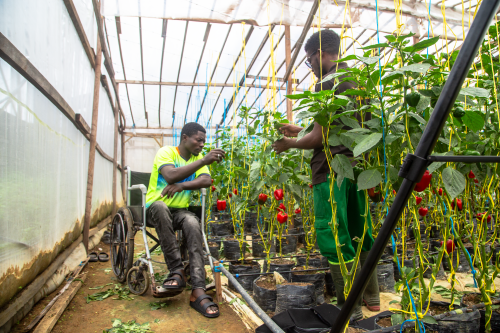
Joel Kamgaing, a greenhouse farmer, tending to crops in a greenhouse in Douala, Cameroon. Photo: Olives Nkwain, bird story agency
After a nearly fatal accident left him wheelchair-bound, a Cameroonian welder turned to greenhouse farming to pick up the pieces of his life, serve his community and get him moving again.
By Akem Olives Nkwain for bird
In the industrial sprawl of Douala, Cameroon’s economic capital, where concrete has taken over much of the greenery, one man has found a meaningful way to bringing greenery into his everyday through agriculture. Joel Kamgaing, a former welder whose dreams once pointed toward Dubai, now cultivates bell peppers in a self-built greenhouse — all from the seat of a wheelchair he engineered himself.
“I was a farmer before being in this wheelchair,” Kamgaing said, wheeling between rows of vibrant crops. “I had a two-hectare pineapple plantation. I was farming at Awaé, near Yaoundé. During one of my regular supervision visits, I was involved in a fatal accident that left me like this.”
The accident left him permanently disabled. For months, the trauma felt like the end of his story. But, Kamgaing embraced the pain and rebuilt his life.
“It messed me up, and I said that was the end. But as time went on, I garnered the strength to start all over.”
Starting over meant more than recovery — it meant innovation. After receiving lessons and support from GreenHouse Academy Cameroon, an initiative of GreenHouse Ventures Cameroon, which was founded by a Cameroonian entrepreneur and activist, Kamgaing transformed a modest plot in Douala’s Yassa neighborhood into a thriving hub of climate-smart sustainable agriculture.
“That starting all over meant going on new basics — the learning of greenhouse farming. That wasn’t easy, but today, I’m able to produce,” he said, holding up a red bell pepper.
Yassa has a tropical monsoon climate — hot, humid, and rainy for most of the year. Temperatures can soar to 30°C during dry spells. Working in such conditions, inside an enclosed greenhouse, demands tenacity. For Kamgaing, it’s a daily ritual that he has come to look forward to.
“At the moment, the farm spreads over 100 square meters, and every week we harvest 30 kilograms of bell peppers. That’s not bad.”
Greenhouse farming remains largely unexplored in Cameroon. But experts say it’s the future.
“Cameroon currently has an estimated 30 million inhabitants, and the numbers are growing,” said Simo Aaron, an agricultural engineer and greenhouse farming specialist. “The more the population grows, the less land is available for farming. Greenhouses allow for crop production right in the heart of town, reducing the need to move to rural areas.”
Aaron believes greenhouse farming offers a sustainable solution to urban food insecurity. “If you venture into greenhouse farming, you’re assured of all round crop production. The returns on investment are high and reliable. The more we construct greenhouses, the less space is used up and the more yields are assured.”
Kamgaing’s farm is a testament to that opportunity. Clean, productive, and increasingly popular with local buyers, the compact greenhouse is a model of urban resilience. Now, Kamgaing wants to expand the farm.
“I have enough space already, but I need the resources to construct another greenhouse to grow more crops. Our crops are in high demand, but I’m unable to meet it because my production is below the need,” Kamgaing said.
Beyond looking for funding, mobility is a daily hurdle. Kamgaing navigates his farm using a manually operated wheelchair — a feat that requires immense effort. He hopes to acquire an electric wheelchair one day. Kamgaing’s story is one of grit, ingenuity and transformative mobility. In a city where farming is often overlooked, he’s proving that agriculture can thrive in the smallest spaces — even from the seat of a wheelchair. His greenhouse isn’t just growing bell peppers. It’s growing his deepening sense of purpose, appreciation for community and at the same time, feeding the local economy with home-grown nourishment.

Leave a Reply